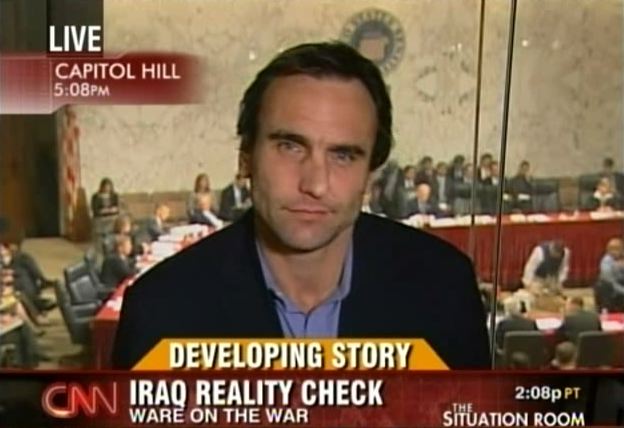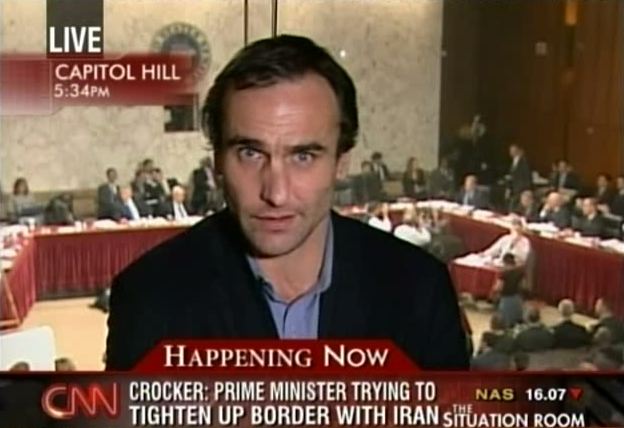TSR: "I just see a lot of oxygen being wasted here."

Length: 5:05
LARGE (59.6 MB) ----- SMALL (6.0 MB)
Michael is on Capitol Hill, covering the Petraeus/Crocker testimony and also gives an outsider's view on the process that allows something this vital to be turned into a campaign moment. In the second clip, Wolf asks him what questions he wished had been asked... now how can we get Michael up on the House committee dais tomorrow?
WOLF BLITZER: When President Bush announced the Iraq troop surge 15 months ago, he also laid out some markers for Iraq to meet.
Let's get a Reality Check right now from CNN's Michael Ware.
He's been covering the war since it began. He's here in Washington right now. He's up on Capitol Hill. He's been watching these hearings all day -- Michael, it must be a fascinating experience for you. But you'll tell us about it in a second.
I want to go through what President Bush told the nation 15 months ago when he addressed the nation, January 2007, about these benchmarks, these goals that the Iraqis were supposed to fulfill and what he predicted -- what he said would happen. And let's get a Reality Check on what actually has happened.
For example, he said the Iraqi government takes responsibility for security in all of Iraq's provinces by November, 2007. That's last November.
That exactly hasn't happened yet, has it?
MICHAEL WARE, CNN CORRESPONDENT: The short answer, Wolf, no, it hasn't. Whilst a number of Iraq's provinces are now under Iraqi control, they are predominantly the Kurdish regions in the north -- which have been self-autonomous even under Saddam since the no-fly zone -- and the Shia-dominated provinces in the south, which are under the control of Iranian-backed militias and political parties.
This is Shia areas where there's very few Sunnis. There's relatively no presence of al Qaeda. And, essentially, as one Western diplomat calls much of the south, it's little Iran without the flag. So we have some provinces under Iraqi control, but we can hardly call that a success. And certainly the entire country, you have to be kidding. No way.
BLITZER: All right. The second thing he set as a benchmark, to give every Iraqi citizen a stake in the country's economy, Iraq will pass legislation to share oil revenues among all Iraqis.
Have they done it?
WARE: Well, there is an oil revenue sharing law, but just because you've got something on paper, doesn't mean it's happening on the ground. It's still bogged down in the process. Certainly it hasn't gone to every Iraqi. The Sunnis certainly aren't seeing the results of that. So, in essence, it's like a half tick. Yes, there's something, but it ain't everything. No, we can't put a full tick in that box, either.
BLITZER: The third thing he said is to show it is committed to delivering a better life, the Iraqi government will spend $10 billion of its own money on reconstruction and infrastructure projects that will create new jobs.
We did some checking. The Government Accountability Office says they've pledged $10 billion, but last year they only spent 4.4 percent of that. The White House says they spent 24 percent of the $10 billion. They still have a long way to go on that front.
WARE: Absolutely. And I think in this year's budget, they have pledged perhaps another $13 billion or something of that order. But again, who cares?
You're not seeing it on the ground, either because of security reasons or sectarian political reasons, where there is no delivery of aid into areas that are deemed hostile to the government, particularly, say, in the Sunni west. So, no. No tick in that box either, Wolf. Certainly not for the ordinary Iraqi, who's eking out their miserable lives amidst the war.
BLITZER: Now, here's another thing he said. To empower local leaders, Iraqis will hold provisional elections later this year, meaning in 2007.
Now they're expecting to hold the elections later this year, meaning 2008, is that right?
WARE: Oh, that's correct. And so, not only has it been delayed, but this has been a difficult birth, this legislation. It was touted by the U.S. mission as part of the political surge -- one of three key pieces of legislation that were finally bludgeoned through the Iraqi parliament. Yet this one was kicked back by the Presidential Council, effectively a veto.
After some backroom dealing and the bashing of heads together, that legislation for the provincial elections is back on. But we still have to draw up provincial elections law. And the clock is ticking on how to do that.
At the end of the day, if these elections are held, again, it's mainly Iran's parties who look to benefit and we're going to see a decentralization of security and power, to that governors and the provincial councils, away from the central government. So no tick.
BLITZER: One of the benchmarks he did mention, to be fair to the president, he did say they would reform the de-Baathification laws.
They have reformed those de-Baathification laws to a certain degree, haven't they?
WARE: Well, if you happen to, you know, one day throw in a couple of bucks and actually join the Baath Party. But, in essence, the real Baathists that this is supposed to target, the people who this is supposed to bring back into the community, they're not touched by this legislation. And, hello, this is a Shia-dominated government -- a government comprised of factions all of whom primarily are linked to Iran in one way or another.
Do you really think they're going to let the Baathists back? The proof is going to be in the pudding. And right now, that pudding stinks. It's not fit for service.
BLITZER: All right. Stand by, because you're going to come back in the next hour. We'll talk about these hearings today. As I said, it's probably interesting for you. Normally, you're in the war zone, but you're on Capitol Hill right now.
We'll get back to you in the next hour, Michael. Thank you.

Length: 3:00
LARGE (35.3 MB) ----- SMALL (3.4 MB)
WOLF BLITZER: Let's get some analysis from our man up there on Capitol Hill, right now, Michael Ware, normally our man in Baghdad, but you're watching this hearing.
What did you think of that exchange, that Senator Obama had with Ryan Crocker and General David Petraeus?
WARE: Well, like much of what I've witnessed today in the Armed Services Committee, now in Foreign Relations, we're not learning anything new. And the questioning by any of the members of the committees is hardly probing. And it seems to be more about politicizing or political grandstanding for the members of the committee's benefit themselves. I mean, it seems like there's so much wasted opportunity here.
Now, obviously Senator Obama was trying to wrap things up and give it a sharper edge to try and pull all these fragments of the testimony that are very much fuzzy on the edges and say, well, look, you know, what is it that can get us out? What is it that can do this?
But I have to say, you know, his questions, like so many others, from so many other people, reflect what strikes me as fundamental misunderstandings about the nature of the fight in the Iraq or the nature of the current situation in Iraq or what it's going to take to hold this country together, even as messy and as ugly as it is right now.
So, I have to say, overall, including Senator Obama's exchange that I think you just witnessed, it's -- it's frighteningly disappointing.
BLITZER: Well, give us one example of a question you would have liked to have heard.
WARE: Well, for example, when we're touching upon Iran: we all know they're there. No need to ask, you know, "what are Iraqi intermediaries are saying, I'm sure you've sent messages there." We all know that. It's been in the papers for goodness sakes. People rant about it on TV.
Let's find out what exactly are you doing to curb Iranian interference. Come on, come clean. What are you doing? How are you cutting out this tumor of Iranian influence?
Because at the end of the day, there is no real answer. Because American policy remains light and fluffy on that. It's, "well they're Persians, they're Arabs, the Iraqis are firmly nationalist, there's a long history but they are scarred by the Iran/Iraq war and let's cross our fingers and hope those divisions are enough to divide them." Well, it hasn't helped with Lebanese Hezbollah and their Arabs. It hasn't helped with Hamas in Palestine and their Arabs. There seems to be very little clarity on the main issue of this war which is America's competition for influence with Iran.
Now, why that's not being drilled home, I have no idea. And I think it reflects the nature of the body -- general body of knowledge held by members of the committee. I mean, I just see a lot of oxygen being wasted here. I wish I could jump in with my own boxing gloves and have a go at it myself.
BLITZER: All right, stand by.
There's still a lot more questioning today. We've got a full day of hearings tomorrow as well, maybe some of those questions you want asked will be asked and answered.
Michael's going to be back with us shortly. Thanks, Michael Ware, up on Capitol Hill.
